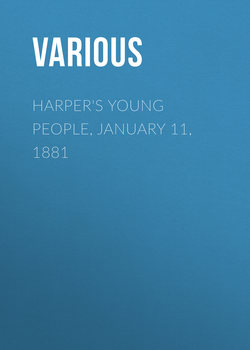Читать книгу Harper's Young People, January 11, 1881 - Various - Страница 1
MILTON
ОглавлениеJohn Milton was a blue-eyed, yellow-haired Saxon boy, the type of the English race. He was somewhat short, stout, and healthy; his eyes were bright and sparkling in his youth, before he became blind. But he inherited weakness of sight from his mother. He was born 1609, in a pleasant house in Bread Street, London, almost under the shadow of Bow Bells. It was back in a court. His father, who had made a fortune as a scrivener, was fond of music, books, and literature, and his son was carefully educated at St. Paul's School. Milton relates that he frequently studied in the house in Bread Street until after midnight, and his head ached and his sight grew dim with these late vigils. He was then about twelve years old.
When he was six years old he may have seen Shakespeare and Ben Jonson pass on their way to the Mermaid Tavern, which was in Bread Street, not far from his father's house. He was one of the best scholars at St. Paul's School, and loved study as most boys like play. He was eager to know how men lived and acted in Greece and Rome, what they thought of, and what they had discovered. He studied the rise and fall of empires and republics, and became a republican in the midst of kings and princes. He was always fond of poetry, and soon began to write fine verses. One of his earliest pieces is his "Ode on the Nativity."
His father leased a place in the country, at Horton, near Windsor, and here Milton wandered when a young man over the smooth-shaven lawns and beside the pleasant streams, filling his mind with knowledge and pictures of fine scenery. It is not likely that as a boy he was fond of fishing or hunting, as we may well fancy Shakespeare was. He never tilled the soil like Burns and Virgil. He knew nothing of farming. He went to Cambridge University, the most learned of its scholars. It was the custom then to whip the students, and Milton's enemies spread the report that he was flogged for some breach of the rules. He was always independent. He travelled, came back to defend republicanism in the civil war, married, kept a school, was Cromwell's Latin secretary after he became blind, and published some poetry. But when the republic fell with Cromwell, Milton was proscribed, and in danger of his life. His enemies would, gladly have put him to death, and "Paradise Lost" might never have been written.
Milton hid in obscurity, blind, forgotten, but constantly engaged on his great poem. He wrote "Paradise Lost" in his old age. He repeated the verses aloud to his daughters or some friends who came to visit him, and they wrote them down. It was finished in 1667, and Milton received twenty-five dollars for the copyright. It was long neglected, until Addison gave it great fame. Milton died November 8, 1674.
